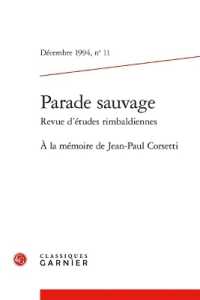Full Description
Using a comparative, feminist approach informed by English and Italian literary and theatre studies, this book investigates connections between Shakespearean comedy and the Italian novella tradition. Shakespeare's comedies adapted the styles of wit, character types, motifs, plots, and other narrative elements of the novella tradition for the Elizabethan and Jacobean stage, and they investigated social norms and roles through a conversation carried out in narrative and drama.
Arguing that Shakespeare's comedies register the playwright's reading of the novella tradition within the collaborative playmaking context of the early modern theatre, this book demonstrates how the comic vision of these plays increasingly valued women's authority and consent in the comic conclusion. The representation of female characters in novella collections is complex and paradoxical, as the stories portray women not only in the roles of witty plotters and storytellers but also through a multifaceted poetics of enclosed spaces - including trunks, chests, caskets, graves, cups, and beds. The relatively open-ended rhetorical situation of early modern English theatre and the dialogic form and narrative material available in the novella tradition combine to help create the complex female characters in Shakespeare's plays and a new form of English comedy.
Contents
Illustrations
Acknowledgements
Introduction: Enclosure, Conversation, and Spaces of Authorship
1. Filomena's Voice and Female Character in Shakespeare's Early Italianate Comedies
2. Thinking Inside and Outside the Box: The Casket Test and Audience Response in The Merchant of Venice
3. The Trunk in Twelfth Night as Mobility Machine
4. Novellesque Domesticity and Impossible Places in The Merry Wives of Windsor
5. Reforming Civility in Measure for Measure
6. Rewriting the "ladies text": All's Well that Ends Well
7. Seeing as Reading and Retelling in Cymbeline
Conclusion
Appendix
Bibliography








